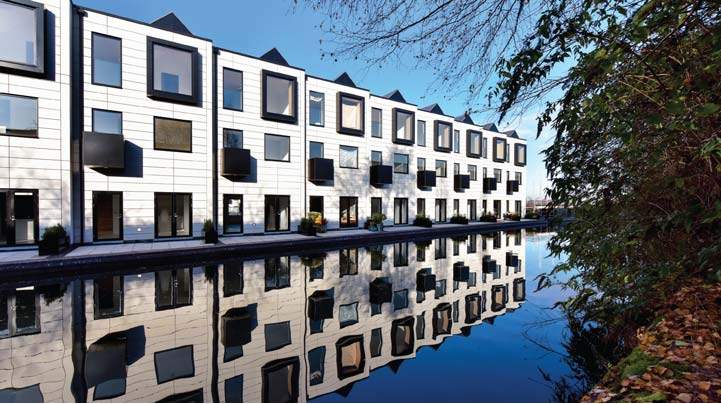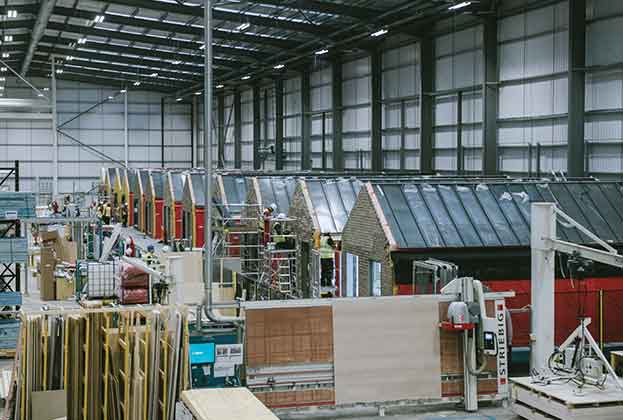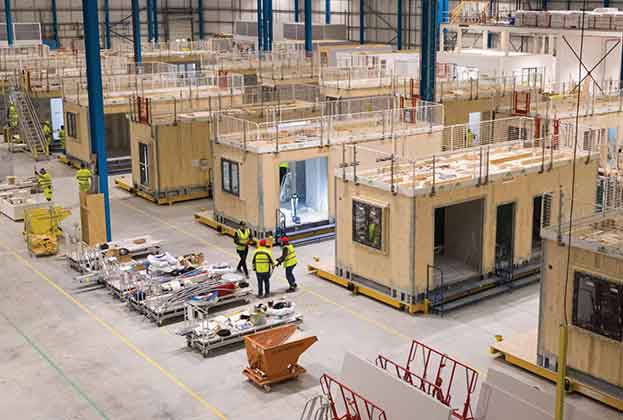There are increasing signs that the housebuilding industry is closer to adopting more Modern Methods of Construction
Building momentum
Over 50 years ago there were calls for the widespread adoption of non-traditional construction methods to achieve house building targets. Sound familiar? In 2018, the House of Lords Science Committee was told that the use of offsite manufacture was the only way to achieve the government target of 300,000 homes per annum.
Accurate statistics are hard to come by, but the best estimates are that traditional construction accounts for over 90% of housebuilding in the UK. The remaining c.10% of homes use Modern Methods of Construction (MMC). But there are signs of change. These were emerging before Covid-19, however, the pandemic could accelerate change and be the turning point for the industry to truly embrace MMC.

Photo Urban Splash
Drivers of adoption
Many factors impact the adoption of MMC, but looking at international examples show that the three main drivers are: the cost and availability of labour, housing supply shortages and regulatory or governmental intervention.
The cost of adopting MMC is generally higher than continuing with business as usual, reducing the incentive to change. However, labour shortages are driving up construction costs. Adoption of MMC, which improves productivity and reduces onsite labour, offers a potential solution.
The supply and demand imbalance of homes is a further driver for adoption. There is a growing acceptance that ‘business as usual’ is not good enough and something has to change. This is causing more and more developers and housebuilders to look at supplementing traditional construction with MMC.
The need to improve energy efficiency and reduce the environmental impact of housing and housebuilding, is a further driver of change. Using traditional techniques it is very difficult to achieve high levels of energy efficiency and studies show substantial material wastage. However, building homes under factory-controlled conditions allows much tighter tolerances to be met, improving energy efficiency and significantly reducing waste.
Growth potential
Before we entered the current pandemic the UK was already facing the three main challenges that have spurred greater adoption of MMC globally. The UK is already facing labour shortages in the construction sector. The Farmer report highlighted that between 2016 and 2026 around 62,000 workers would retire each year. However, the government’s latest figures show only around 23,000 new apprentices starting each year. This is likely to be exacerbated by changes to the immigration system once we leave the EU. 10% of the 2.2 million people that work in construction in the UK have migrated here. Research from the IPPR suggests that 59% of the current construction workforce that has migrated from the EU would be ineligible for a visa under the proposed new rules.
Despite housing delivery increasing steadily over the past few years, the number of new homes built still needs to increase by 24% to reach 300,000 homes per annum. This is going to be an extremely tall order using traditional construction alone.
If we are serious about meeting the pledge to be carbon neutral by 2050 then the energy efficiency of homes will need to dramatically improve, along with reducing the environmental impact of construction. Both things that MMC is well placed to deliver on; highlighted by the homes that Project Etopia UK are building, which use 39% less CO2 during construction than traditional construction and are expected to save 167 tonnes of carbon over 25 years of use.
These three factors will lead to increased adoption over the next decade. We expect that over the next 10 years the proportion of homes built using MMC will rise from today’s 6–10% to closer to 20%.
Covid-19 has the potential to accelerate this. The Homes for Heroes campaign, if fulfilled, would provide the certainty of demand that manufacturers need to attract investment and scale up operations. Also, building in a factory environment makes it easier to implement social distancing requirements while maintaining high productivity.
Defining Modern Methods of Construction
MMC is a ‘catch-all’ phrase that means different things to different people. With this in mind in 2019 the Ministry for Housing Communities and Local Government published a definition framework.
This set out seven categories for defining MMC, the first five of which use offsite construction
Homes for Heroes
Echoing drives to build homes for returning soldiers after the two world wars, on 12th May 2020 the Homes for Heroes campaign was launched. The initiative, which is backed by the G15 group of housing associations, modular manufacturers, the British Property Federation and architects, aims to persuade government to set aside public land for 100,000 new offsite constructed homes. These homes would be delivered over a five-year period and be for key workers.
.jpg)
Photo Project Etopia UK
Read the articles within Spotlight: Modern Methods of Construction below.


